Occupational Health Surveillance Program
Publications
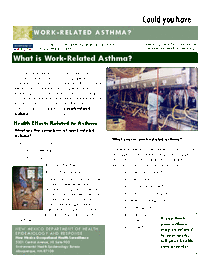 Work-Related Asthma FAQ
Occupational Health Surveillance - Help
October 9, 2025
Work-Related Asthma FAQ
Occupational Health Surveillance - Help
October 9, 2025
This extremely helpful document answers many frequently asked questions about work-related asthma. It explains what work-related asthma is, the health effects related to asthma, what the symptoms are, what causes it, which workers can get it, what you can do if you think you have work-related asthma, and provides a number of helpful website resource links so you can learn more and protect yourself from work-related asthma.
 Cleaning Products & Work-Related Asthma Poster
Occupational Health Surveillance - Marketing
January 16, 2025
Cleaning Products & Work-Related Asthma Poster
Occupational Health Surveillance - Marketing
January 16, 2025
This two-sided informational brochure explains what asthma and work-related asthma are, cleaning products, workers exposed to cleaners, symptoms, seeing your doctor, and how to practice safe cleaning.
 Occupational Health Case Reporting
Occupational Health Surveillance - Form
March 15, 2018
Occupational Health Case Reporting
Occupational Health Surveillance - Form
March 15, 2018
This confidential case reporting form allows health care providers and lab directors to meet the requirements of the law by reporting occupational and/or injuries to the New Mexico Occupational Health Surveillance Program (OHSP) within 24 hours. Additional instructions for reporting a case are contain within the document.
 Silicosis in New Mexico Infographic
Occupational Health Surveillance - Marketing
July 11, 2014
Silicosis in New Mexico Infographic
Occupational Health Surveillance - Marketing
July 11, 2014
This infographic illustrates that New Mexico has historically high rates of silicosis because of mining. However, not all silicosis in the state is mine-related. It clearly shows the relative comparison of deaths from or with silicosis by industry between mining, construction, or other industries. It goes on to explain that silicosis is a preventable occupational lung disease that is caused by breathing in dusts containing crystalline silica and more.
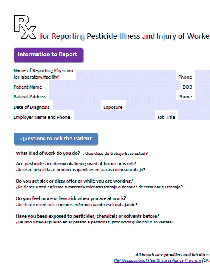 Pesticide Illness Reporting
Occupational Health Surveillance - Form
April 2, 2014
Pesticide Illness Reporting
Occupational Health Surveillance - Form
April 2, 2014
This form should be used by all healthcare professionals to report pesticide related illness and injury of workers in New Mexico to the Occupational Health Surveillance Program. It includes a list of questions you can ask your patients and the symptoms of pesticide exposure are also listed in both English and Spanish.
 Lead Exposure and Illness in New Mexico Adults Infographic
Occupational Health Surveillance - Marketing
February 25, 2014
Lead Exposure and Illness in New Mexico Adults Infographic
Occupational Health Surveillance - Marketing
February 25, 2014
This infographic is explains about lead exposure and illness in adults and illustrates what the Occupational Health Surveillance Program does including case management services, works with healthcare providers to determine sources of lead, collects data and additional information, and collaborates with OSHA. It also explains how work-related illnesses are tracked.
 Mesothelioma in the Workplace in New Mexico Infographic
Occupational Health Surveillance - Marketing
February 25, 2014
Mesothelioma in the Workplace in New Mexico Infographic
Occupational Health Surveillance - Marketing
February 25, 2014
This infographic is explains about mesothelioma in the workplace in New Mexico and explains that exposure to asbestos fibers is the primary risk factor in developing mesothelioma, provides a list of occupations with risk of asbestos exposure, states the typical timeframe between asbestos exposure and mesothelioma diagnosis, and provides the protocol and decision tree used.
 Notifiable Conditions Reporting FAQ
Occupational Health Surveillance - Help
March 25, 2013
Notifiable Conditions Reporting FAQ
Occupational Health Surveillance - Help
March 25, 2013
Health care providers are the eyes and ears of public health. Reporting makes it possible to detect failures of work place health and safety protection and prevent further illness and injury due to work. This document explains the most frequently asked questions we receive regarding occupational notifiable conditions reporting.
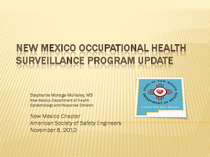 Occupational Health Surveillance Program Update 2012
Occupational Health Surveillance - Presentation
November 8, 2012
Occupational Health Surveillance Program Update 2012
Occupational Health Surveillance - Presentation
November 8, 2012
This presentation explains what the overall goal of the program is, what the reportable occupational conditions are, employment demographics, then provides data on injury and death rates.
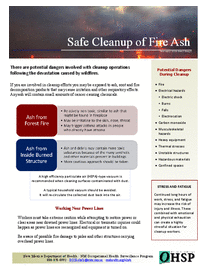 Safe Cleanup of Fire AshSafe Ash Fact Sheet
Occupational Health Surveillance - Help
February 12, 2012
Safe Cleanup of Fire AshSafe Ash Fact Sheet
Occupational Health Surveillance - Help
February 12, 2012
There are many potential dangers involved with cleanup operations following the devastation caused by wildfires. If you are involved in cleanup efforts you may be exposed to ash. This fact sheet describes details about the potential dangers which include fire, electrical, carbon monoxide, musculoskeletal hazards, heavy equipment, thermal stresses, unstable structures, hazardous materials, and confined spaced.
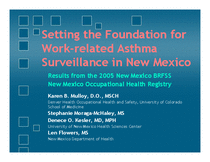 Setting the Foundation for Work-Related Asthma Surveillance in New Mexico
Occupational Health Surveillance - Presentation
August 26, 2009
Setting the Foundation for Work-Related Asthma Surveillance in New Mexico
Occupational Health Surveillance - Presentation
August 26, 2009
This presentation explains the occupational asthma project goals, desired outcomes, what is known to date, the approach and objectives, explains what the BRFSS is, reviews statistical data regarding asthma in New Mexico, then states conclusions.

